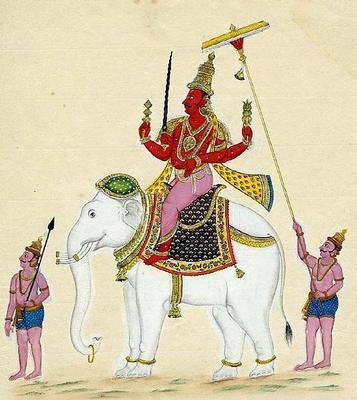|

|
|
O dear, come here with your friends
With the hymns that Indra commend.
Sing his songs that can transcend,
Among the rich as prince he stands.
He, with all precious treasures brims,
Outpour your Soma juice to him.
Sing his songs who in need attends,
His gracious support to us he lends,
Bountiful wealth to us extends,
May he in strength join our band.
His horses yoked in chariot attend,
In battle field none them withstands.
Soma mixed with curd is made,
For him we have this cascade.
Oblige the Soma lover’s brigade,
In perfect strength you here parade.
For Soma born and designate,
You are in strength and eminence great.
O Indra*, by songs you fascinate,
Pray, our Soma formulation permeate.
O Sage, accept our offerings and rejoice,
We sing hymns in your praise, of choice.
Let our songs be thy strength and lyre,
This is what we earnestly desire.
O Indra, your shelter never fails,
Pray our food-offering kindly avail.
Thousandfold power in it prevail,
So, let no one our bodies assail.
O music lover, save us from sword,
You alone can protection afford.
Source: Inspired by Rig Veda hymn 1: 5
*Indra is the chief god of the Rigveda (besides Agni) . He delights in drinking Soma, and the central Vedic myth is his heroic defeat of Vritra, liberating the rivers, or alternatively, his smashing of the Vala, a stone enclosure where the Panis had imprisoned the cows, and Ushas (dawn) . He is the god of war, smashing the stone fortresses of the Dasyu, and invoked by combatants on both sides in the Battle of the Ten Kings.
The Rig-Veda frequently refers to him as ? akra - the mighty-one. In the Vedic period, the number of gods was assumed to be thirty-three and Indra was their lord. (The slightly later Brihad-aranyaka Upanishad enumerates the gods as the eight Vasus, the eleven Rudras, the twelve Adityas, Indra and Prajapati) . As lord of the Vasus, Indra was also referred to as V sava.
Indra is an important god in many Hindu mythological tales. He leads the Devas (the gods who form and maintain Heaven) and the elements, such as Agni (Fire) , Varuna (Water) and Surya (Sun)) , and constantly wages war against the demonic Asuras of the netherworlds, or Patala, who oppose morality and dharma. He thus fights in the timeless battle between good and evil. As the God of War, he is also regarded as one of the Guardians of the directions, representing the east.
Modern Hindus, however tend to see Indra as minor deity in comparison to others in the Hindu pathenon, such as Shiva, Vishnu or Devi. A Puranic story illustrating the subjugation of Indra's pride is illustrated in the story of Govardhan hill where Krishna, avatar or incarnation of Vishnu carried the hill and protected his devotees when Indra, angered by non-worship of him, launched rains over the village.
|
|